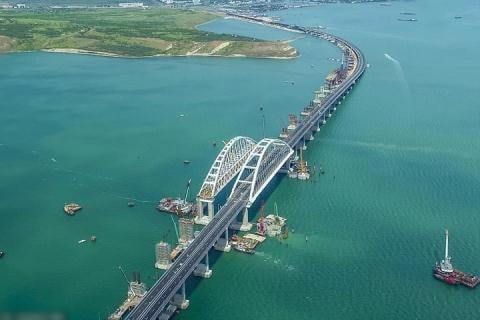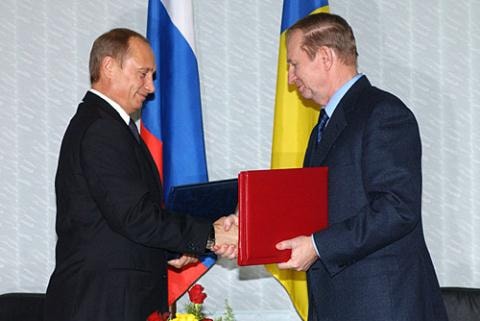Painful consequences for Ukraine and the West when the Crimea bridge is opened
Kiev and its "distant brothers" were frustrated with Moscow's construction and inauguration of the Kerch Bridge, so they acted improperly.
Ukraine loses control of the Sea of Azov, causing huge economic damage
Kyiv Post commented on June 15 that Russia's inauguration of the bridge connecting Crimea with the North Caucasus was a milestone marking the Kremlin's full control of the Kerch Strait and control of the Azov Sea, even the Black Sea.
"In late May 2018, Russia quietly redeployed six military ships from the Caspian Flotilla to the Sea of Azov. These are military ships and coastal patrol vessels designed for operations in shallow waters such as the Sea of Azov.
And in May, the Russian Navy also conducted exercises very close to Ukraine's exclusive economic zone in the Sea of Azov, even partially blocking the sea to serve the exercises," Kyiv Post reported.
 |
| The construction and inauguration of the Kerch Bridge has helped Russia increase its interests and advantages in both the Azov Sea and the Black Sea. |
According to military expert Paul Goble of the Jamestown Foundation, Moscow's moves are intended to warn Kiev that if Ukraine tries to use force to liberate the separatist territories, Russia will respond from the Sea of Azov.
Not only that, since Russia inaugurated the Kerch Bridge, Ukraine's economic losses due to losing control of the Azov Sea and the Kerch Strait after this historic event have become more and more serious.
Since late May, Russian navy or security patrol vessels have been delaying international cargo shipments to and from the ports of Mariupol and Berdyansk, as checking crews and cargo takes a long time.
Meanwhile, Ukrainian naval ships are not regularly present in the Sea of Azov, so Ukrainian shipping companies and ports lose thousands of dollars every day, according to Boris Babin, the Ukrainian President's representative on Crimea.
Ukraine only has naval squadrons of border guards patrolling its territorial waters, but they can do nothing to stop the expansion of Russian activities. Because Russia is not breaking the law.
"Russia has not violated any laws, although officially the Sea of Azov is our common national sea," said Oleh Slobodyan, a spokesman for the Ukrainian Border Guard.
In 2003, Ukrainian President Leonid Kuchma and Russian President Vladimir Putin signed an agreement between Ukraine and Russia on cooperation and joint use of the Sea of Azov and the Kerch Strait. The agreement was ratified in 2004 and remains in force.
"Ukraine and the Russian Federation, being two fraternal countries with historical traditions, identify the Sea of Azov and the Kerch Strait as an economically important area for both countries," the agreement states.
 |
| The Azov Sea agreement between Russia and Ukraine is still in effect, but Maidan politicians forget it. |
The Azov Sea Agreement also defines the sea as the common territorial waters of Ukraine and Russia, allowing Russia to transport goods and conduct military activities in any area of the Azov Sea.
Therefore, “Russia blocked all the proposals of Ukraine, although we officially have a border on the Sea of Azov,” said the expert of the organization that monitors the actions of Russia and Ukraine in Crimea and the Black Sea, Klymenko.
The Sea of Azov is the shallowest sea in the world. Ukraine exploits the deepest part of the Sea of Azov at the ports of Berdyansk and Mariupol, where the depth is 8-10 meters, allowing medium-sized cargo ships to be accommodated.
After Russia began building the Crimean Bridge in April 2015, Russia forced Ukraine to use small cargo ships when passing through the Kerch Strait - where the Azov Sea and the Black Sea meet - and then transfer the load to larger ships in the Black Sea.
That caused the volume of cargo transshipment at the port of Mariupol in Donetsk to fall by 14%, from more than 8.9 million tons of cargo in 2015 to just 6.5 million tons in 2017.
The situation is even worse at the port of Berdyansk in Zaporizhzhia Oblast, where cargo transshipment volumes fell by 30%, from 4.5 million tons of cargo in 2015 to 2.4 million tons in 2017.
Expert Klymenko said that in addition to Russia deliberately designing the Kerch Bridge with a low clearance height to prevent large ships from entering the Sea of Azov through the Kerch Strait, the FSB also began stopping cargo ships going to and from the ports of Mariupol and Berdyansk.
“Started in late April 2018. At first, they said that Ukrainian cargo ships going to and from Ukrainian ports were stopped for inspection because of a terrorist threat. Later they said that they were hunting Ukrainians who planned to blow up the Kerch Bridge.”
 |
| Mr. Putin on the day of the inauguration of the Kerch bridge - the result of his strategic move. |
As a result, while the first trains were stopped for only a maximum of two hours, after the Kerch Bridge was opened, Russia began stopping and checking for longer periods, causing great damage to the Ukrainian economy, according to expert Klymenko.
Ukraine and the West regret letting Russia build the Kerch bridge
Russia's strict control of ships passing through the Kerch Strait after the Kerch Bridge was built and inaugurated can be strongly condemned, but it is Ukraine and its "distant brothers" who have helped Russia do that and cannot be condemned.
Because President Poroshenko himself warned the Crimean Tarta people about the dangers of the Kerch bridge, it was seen as an encouragement for this ethnic group - who did not agree with Crimea's return to Russia - to try to destroy the bridge.
For Ukraine's "distant brothers" things were even worse, when the American newspaper Washington Examiner published an article inciting Ukraine to blow up the Krech Bridge.

